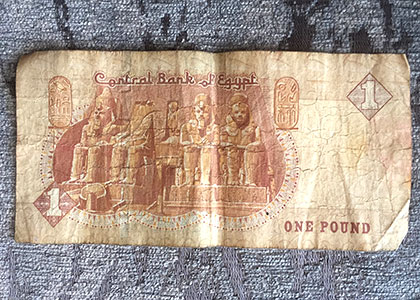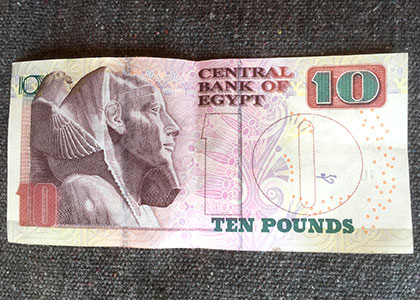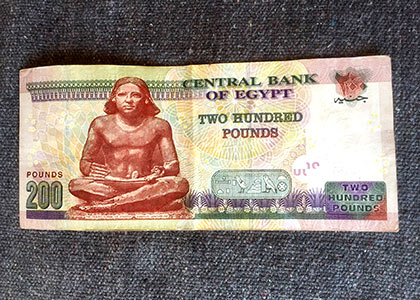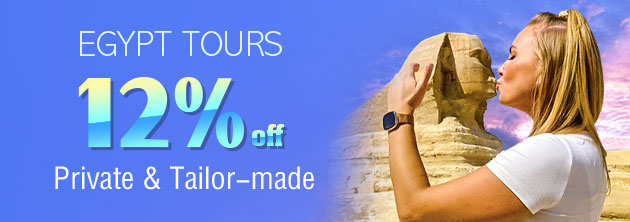Currency in Egypt: Tips for A First-Time Traveler
Note to Remember

1 Egyptian Pounds
|
• 1 piastres/ersh = 1,000 milliemes
• 25 and 50 piastres, E£1, E£5, E£10, E£50, E£100, and E£200 denominations available
• 25 and 50 piastres, E£1 denomination available in coins
• Smaller value denomination is short in supply
• The currency is bilingual - Eastern Arabic and English numerals printed on either side
• Local restaurants, small vendors, mid-range shops, and tour operators prefer currency over contactless payments
• High-end stores and resorts have cashless payment facilities
• Tipping in Egypt is a part of the local culture and essential for the survival of the low-income groups
• Traveler's checks are not valid
• Often prices precede by LE or livre égyptienne (French translation for Egyptian pound)
While planning your exotic adventure in Egypt, you have to factor several things into consideration. Ideally, handling and managing currency in Egypt should be included in the list. In this African tourist hotspot, you have to spend a lot of currency bills. Although contactless payment options are available, small vendors and shop owners still prefer currency bills to make the payment.
The Egyptian Pound (EGP) is the official currency in Egypt and represented through sign E£. Divided into 100 piastres (ersh), the 25 piastres and 50 piastres are the smallest denominations issued by the Central Bank of Egypt (CBE). These currencies are available in the form of coin and paper money.
Travelers will find ATMs and money changers in almost all the tourist hot-spots. But for the remote areas, far South or North, carrying cash is always recommended.
Currency and Denominations in Egypt
1 Egyptian Pound (EGP) is divided into 100 piastres. The smallest denomination (25 and 50 piastres and E£1) are available in coins as well as currency bills. Apart from that, £1, E£5, E£10, E£50, E£100, and E£200 are available in paper bills. You can withdraw cash from the ATMs or exchange the money from the local money exchanger.
|
|
|
P.S: Smaller currency in Egypt, although short in supply, can be very handy for paying tips. Travelers recommend stockpiling the notes for ease in paying.
Current exchange rate and where to exchange the money
The current exchange rate (dated 2020 for reference)
• American Dollar to Egyptian Pound: US$1 = E£16.01• Euro to Egyptian Pound: €1 = E£18.78
• Canadian Dollar to Egyptian Pound: C$1 = E£11.99
• Japanese Yen to Egyptian Pound: ¥1 = E£0.15
• Pound sterling to Egyptian Pound: £1 = E£20.73
P.S: The exchange rates are subjected to change frequently, check reliable sources for current exchange rates.
Credit cards and contactless payments
Almost all the high-end stores, retail outlets, and hotels accept major credit cards and mobile wallets in the prime tourist destinations. Contactless payment options are also available. Amex cards are not widely used, as retailers and hotels tend to prefer Visa or a Mastercard. For tourists, who often travel abroad, opting for credit and debit cards sans foreign transaction fees is recommended.Money exchangers
In Egypt, travelers can change their home currency for Egyptian bills at Amex outlets, all major airports and high-range hotels. You can also exchange cash at dedicated banks.Remember, you might be charged a commission and additional fees for the exchange of currency in Egypt. Before converting your home currency, make sure to ask sufficient inquiries about the same. In Egypt, travelers can easily convert American Dollars or Euro to Egyptian Pound (and vice versa).
Nevertheless, remember to inspect the currency bills minutely before leaving the exchange counter. Also, do not accept torn or defaced bills, as offloading them could be a hassle.
P.S:
1. Travelers can bring up to 5,000 EGP into Egypt. 10,000 USD, or equivalent amount of foreign bills, can be brought inside the country and exchanged with the local currency.
2. Numerous hotels, high-end stores, and tour operators prefer American Dollar to Egyptian Pound.
Money-related etiquettes in Egypt
In Egypt, haggling and giving out tips is an integral part of the local culture. While shopping at the local bazaars and souks, indulge in bargaining. It can be a fun activity for tourists with some time in their hands, as travelers who do not indulge in haggling are expected to pay more.As a thumb rule, start haggling by quoting the price below half of what the seller has initially stated. It is the toughest form of haggling, done by veteran shoppers. You might be getting a wounded response, or outraged uproar, from the vendor – but it is all the part of the game. A milder form of haggling is quoting a price little below the amount you are willing to pay. And, suggest the vendor to through in items or goodies to make a sweet deal.
If the two parties agree upon the price, then relax and sip in the customary tea offered at the store.
Apart from haggling, you will be expected to pay baksheesh or tip almost everywhere. Remember to keep smaller denomination currency in Egypt for paying tips.
Here is a simplified chart to help you with the tipping:
• Cafes - LE5 to LE10• Bars and hotel waitstaff – LE10 to LE15
• Hotel concierge – LE320
• Guards - LE5 to LE20
• Guides – LE60 to LE65
• Taxis - 5% extra on the fare or rounding off the fare depending on the service
• Mosque attendant - LE5 to LE10
How to carry money?
Try to carry currency in Egypt discretely. Ideally, use a money belt to carry money discreetly. Also, remember to keep small bills nearby to pay tips/baksheesh. Flashing large bills in public might attract the unwanted attention of the miscreants.Lastly, Egypt is a popular tourist destination, and you will uncover a lot of adventures on your trip. Try to manage your daily spending wisely and research before heading to a tourist attraction.



